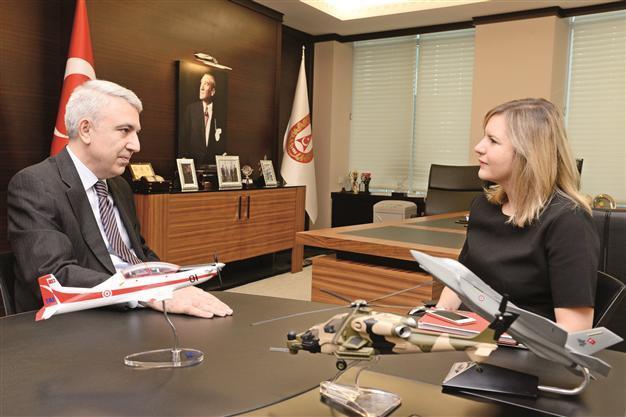Turkey ‘cannot ignore’ Western concerns over missile deal
Cansu Çamlıbel ANKARA / Hürriyet

Hürriyet photo
Murad Bayar, the head of Turkey’s defense procurement agency, has dismissed claims that his organization has ignored Western concerns regarding a controversial air and missile defense system Turkey intends to buy from a Chinese manufacturer.
“Absolutely, there are some concerns that we can accept,” said Bayar, head of the Undersecretariat for Defense Industries (SSM), pointing to “information security” and “interworking.”
“We have accepted it and are taking precautions. Our Western allies may be concerned as they don’t have all the details, but we are acting openly. If they want, we can explain it to them,” Bayar said.
Citing “a few risk points” in the Chinese proposal, Bayar told daily Hürriyet that U.S. and European companies still had time until April to improve their tender offers.
“Actually, we received the tender offers and the decisions were made by the executive committee last September. For us, the tender procedure was over and the ranking turned out to be 1) China 2) the European offer 3) the American offer. If the negotiations had been concluded with the first offer [China], the deal would have been done. However, if it’s not possible, which sometimes happens because of complex details involved. For instance, we still haven’t been able to conclude the Sikorsky tender after 2.5 years, as problematic issues come up. This could happen with the Chinese offer, too,” said Bayar.
The bid to construct a long-range air and anti-missile system from China Precision Machinery Export-Import Corp. (CPMIEC), which won the tender Sept. 26, 2013, came in at $3.44 billion. The Chinese contender defeated a U.S. partnership of Raytheon and Lockheed Martin, offering the Patriot air defense system; Russia’s Rosoboronexport, marketing the S-300; and the Italian-French consortium Eurosam, maker of the SAMP/T Aster 30.
After asked if there were problems with the current Chinese offer, Bayar said there was “a few risk points,” although they were not at a stage that could block the process.
Admitting that they’re not “completely convinced” yet, he said: “If we decide that we can’t do it with China, then we’ll move to the second offer, which is the European one. The deadline was previously the end of January, but now we have extended it to the end of April. If they improve their offers, we could consider them. This is what the foreign minister said.”
Following criticism from NATO partners, Foreign Minister Ahmet Davutoğlu announced at the Munich Security Conference earlier this month that the second and third companies in the SSM’s ranking could still renew their offers. In addition to the price, Turkish authorities said the assurance of joint production in Turkey and guarantees of technology transfer were the main factors in convincing them to opt for CPMIEC.
Bayar, meanwhile, also defined the Cyprus crisis of 1974 as a “historic breaking point” for Turkey’s defense industry. “Until then, Turkey supported its military needs mostly through NATO. In 1974, Turkey was obliged to solve a national security problem of its own by its own means,” he said.
The subsequent arms embargo imposed on Turkey by the U.S. Congress was “so heavy” that it “shook” Turkish authorities, who consequently allocated more resources to developing a national defense industry.
“Today, the river is changing its course. Until the 1990s, the river had been flowing predominantly through the purchase or licensed production of foreign [defense] products. Now, the course of this river has changed toward the native development and production of them,” Bayar said.
Emphasizing that Turkey now saved around $4 billion annually through its defense policies, Bayar said the national defense budget of the country should actually exceed the current level of $16 billion.
CPMIEC is blacklisted by the United States, which implemented sanctions against the company in January 2013. “The sanctions are for two years [to continue for one more year]. The U.S. had imposed and then abolished the same sanctions in the past. This is an issue about America’s foreign policy,” Bayar said.
Touching on Turkey’s possibly response if Washington slapped an embargo on Ankara over CPMIEC as it did in 1974, Bayar said: “Such an option should be carefully examined. This would mean an escalation. I believe that it wouldn’t be a logical action for anybody. This individual issue should be evaluated in itself.”
As its longest serving head, Bayar is not sure if his term at the helm of SSM will be renewed. Speaking in perhaps his last interview as the SSM’s head, he said he was ready to account for 400 projects that the agency developed over the last 10 years.
In the past 30 years that Bayar served in the SSM, the agency saw just four different heads. “This is the nature of this business. There are very significant investments. We used a part of the national resources in changing the course of the river,” he said.
